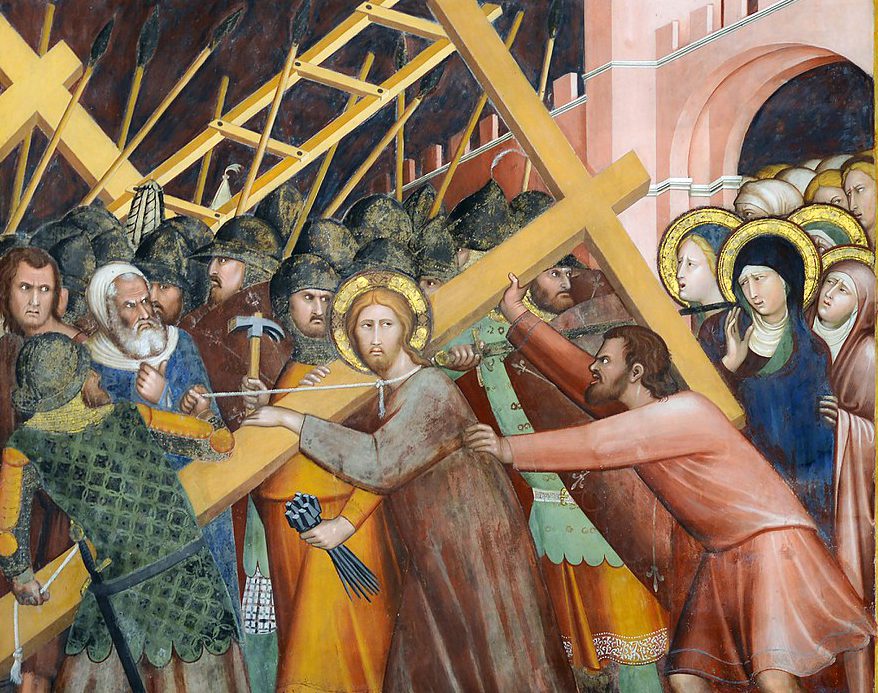Depending on your understanding of the Bible, you may or may not believe that Jesus did everything that New Testament writers attribute to him. Or, like many progressive Christians, you may think that some of the stories about him and his life are metaphors, intended to teach readers how to live as a Christian. But those more historically inclined may wonder: Did Jesus exist at all? After all, the Bible is primarily a religious text, designed to bring would-be believers to the faith. Historians don’t universally agree on all the details about him, but most agree that he existed.
Here are three things that we do know.
1. Roman authorities most likely crucified him.
Both Biblical and non-Biblical sources mention the event, and most scholars agree it happened. Roman senator Cornelius Tacitus, whose writings many scholars consider reputable, provides an extra-Biblical account of the execution of a man called “Christus” by Pontius Pilate: “[N]either human effort nor the emperor’s generosity nor the placating of the gods ended the scandalous belief that the fire had been ordered [by Nero]. Therefore, to put down the rumour, Nero substituted as culprits and punished in the most unusual ways those hated for their shameful acts … whom the crowd called “Chrestians.” The founder of this name, Christ [Christus in Latin], had been executed in the reign of Tiberius by the procurator Pontius Pilate … Suppressed for a time, the deadly superstition erupted again not only in Judea, the origin of this evil, but also in the city [Rome], where all things horrible and shameful from everywhere come together and become popular.”
First-century Jewish writer Flavius Josephus also describes Jesus’ crucifixion at the hands of Pilate in a passage that many scholars consider to be at least somewhat true. But the authenticity of the text is also contested — some suspect that later Christians altered it.
2. Crucifixion is a plausible cause of death.
The Roman Empire, like prior empires, used crucifixion as a method of capital punishment around the time that Jesus is said to have lived and died. It was usually used to send a message to witnesses, to dissuade them from committing crimes. We have at least one archeological example of crucifixion and another possible one.
More on Broadview:
- What ‘Paradise Lost’ teaches us about life in isolation
- John Dominic Crossan on what we get wrong about Easter
- All the reasons why I need my Jesus to be Black
3. Most historians believe that John the Baptist baptized him.
In Mark Allan Powell’s book “Jesus as a Figure in History,” Powell discusses the importance of embarrassment or awkwardness as a criterion for historians in determining whether or not a piece of information is true. “The point, quite simply, is that Christians would not have made up stories that caused problems for the church,” he writes. Jesus’ baptism by John could have been embarrassing, Powell says. That’s because the latter baptized people as repentance for their sins, and Jesus was supposed to be without sin. By being baptized, Jesus “seems to have implied he wanted to become the latter’s disciple.” Powell also uses the criterion of dissimilarity to argue for the authenticity of other details about Jesus, including that he called God “Abba” (an informal term for father) and that he ate with social outcasts like tax collectors, stating that such words and actions did not appear to be used or practiced by Jews in Palestine at the time and nor were they part of the early Christian church or liturgies. But he also says that this criterion is controversial, and that not every historian agrees.
***
Emma Prestwich is Broadview’s digital editor.
















Jesus was summarily tried by the religious temple authorities for blasphemy first. They could not authorize a death sentence under Roman rule. They remanded Jesus to Pilate who alone had the power to authorize a death sentence. There is one other thing that we ‘know’ about Jesus. Historically he was crucified, died and buried and on the third day he rose again. That is the center of the gospel proclamation regardless what kind of Christian you label yourself. If Jesus was a good man who died there is no compelling reason to follow him at all than there is any reason to follow anyone else.
Which proves the fourth reason Jesus was real. The Jews and Romans of that day were willing to die for Him.
Seriously who would die for a fictitious person? Even today?
As a critical thinker of the Bible and one who reads about it a lot, may I suggest a book by noted theologian Bart D. Ehrman titled Jesus Before the Gospels. I found it a real eye opener as it delves into Form Criticism, the memories of Jesus and how the stories of Jesus came to be. Those who are interested will find it most interesting especially if we choose to deal with “facts.”
An agnostic atheist is not a noted theologian.
I have problems with people who “used to be” Christians.
A set person firm in their beliefs doesn’t change, because God doesn’t change.
Like Charles Templeton this man struggled with pain and suffering. A good look into the book of Job settles the matter.
Those who are able to think critically often find themselves away from the crowd. These people are leaders rather than followers. Sometimes there are few to lead but the reward of thinking for oneself is more fulfilling. Those few who stand on mountain tops can often see the bigger picture.
And yet thousands of these intellectuals, over centuries, have been trying to disprove something that they are still trying to dispute? I see the bigger picture…
There are those who live in the valley in community with one another and are quite content to do so. All is secure. They have no need or desire to be challenged. Then there are those who contemplate the mountain tops and rise to the challenge of striking out on their own. They forge their own path and reach the top and gain understanding.
Ehrman started out as a conservative Christian, a literalist. Through education he gradually became a progressive, a liberal and agnostic and finally an atheist. He is still a theologian.
Jesus forged his own path as did the apostle Paul. I choose to see these as an example of finding my own path which works for me. As a friend of mine once wrote, “God is real, but not what you think.”
I do believe in God, just not the way many Christians do. My spirituality works for me as yours does for you. I also read Marcus Borg, Alvin Boyd Kuhn, Tom Harpur, Thomas Moore, Barrie Wilson and many others. My journey is not without its scholarship. As well, I’ve had four years of theological college and an M. Div. Others have more education and I don’t say this to gloat but in seminary we were advised to think critically. Well, when we think critically, that leads us into many interesting places. Some folks prefer stories, that’s why Jesus told parables. Some folks want more. I wanted more.
Alas, the bigger picture becomes fuzzy the longer you look at it.
I would recommend the book “Can we trust the Gospels?” by Peter J. Williams. Excellent academic credentials, and solid reasoning with an answer: “Ys, we can.”